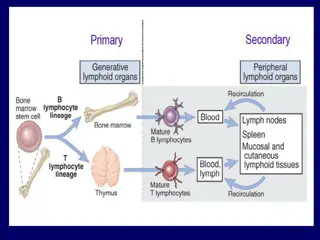Overview of Immunology: From Historical Perspectives to Modern Techniques
Immunology is the study of the immune system, its functions, and responses to various stimuli. The field traces back to ancient times, with historical figures like Thucydides and Edward Jenner contributing to its development. From innate immunity to adaptive responses, the immune system plays a cruc
0 views • 29 slides
Autoimmunity Screening for Kids (ASK) Study Findings in Colorado Population
Autoimmunity Screening for Kids (ASK) conducted a study in Colorado on over 30,000 children aged 1-17, revealing a 1.0% prevalence of pre-symptomatic Type 1 Diabetes (T1D) and a 2.1% prevalence of celiac disease/autoimmunity. The screening showed a significant reduction in Diabetic Ketoacidosis (DKA
1 views • 15 slides
Understanding Autoimmunity and Autoimmune Disorders
Autoimmunity refers to the immune system's failure to recognize its own cells, leading to attacks on self-tissues. Autoimmune disorders encompass over 80 chronic illnesses where the immune system mistakenly targets organs. These disorders are poorly understood and recognized, impacting various organ
1 views • 20 slides
Understanding Autoimmunity and Immunological Tolerance
Autoimmunity is a condition where the body's immune cells mistakenly attack its own tissues, leading to damage. Immunological tolerance helps prevent this by mechanisms like central and peripheral tolerance. Central tolerance involves deleting self-reactive immune cells during maturation in key orga
1 views • 32 slides
Immune Response Regulation and Autoimmunity Overview
The immune system maintains a balance through tolerance mechanisms to prevent autoimmunity. Central and peripheral tolerance play crucial roles in immune unresponsiveness to self-antigens. Failure in immune regulation can lead to autoimmune diseases like diabetes and lupus. Vaccination, discovered b
0 views • 18 slides
Understanding Mixed Connective Tissue Disease (MCTD)
Mixed connective tissue disease (MCTD), also known as Sharp's syndrome, is a rare inflammatory rheumatic disease diagnosed through clinical evaluation, patient history, or special blood tests. Symptoms include overlapping connective tissue disease symptoms, with main cause being autoimmunity. It can
0 views • 7 slides





